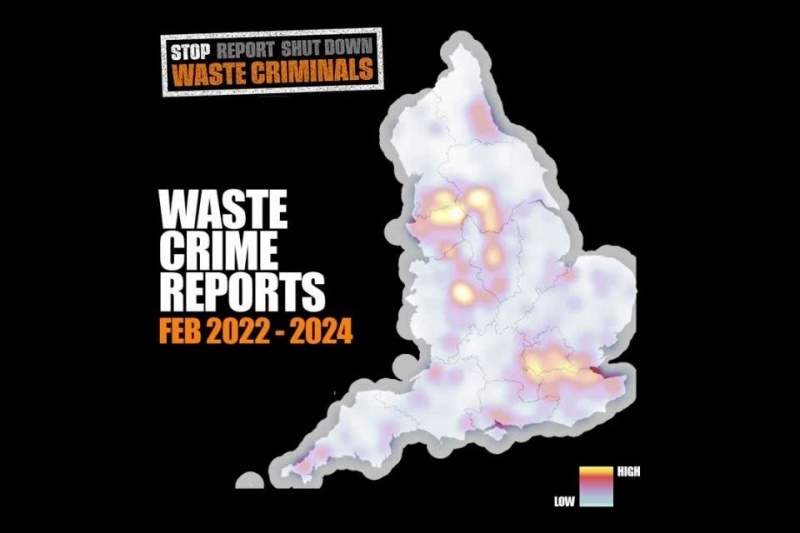EA publishes heatmap of waste crime hotspots
Environment Agency data shows nearly 17,000 incidents across the country, with West Midlands, Yorkshire and East Anglia recording highest levels.
 The Environment Agency has published new heatmaps showing the distribution of 16,773 suspected waste crime reports across England over 2023.
The Environment Agency has published new heatmaps showing the distribution of 16,773 suspected waste crime reports across England over 2023.
The data shows that the West Midlands recorded the highest concentration of illegal activities with 2,008 reports, followed by Yorkshire with 1,791 reports and East Anglia with 1,678 reports.
The mapping exercise forms part of a government clampdown on rogue waste operators, with waste criminals estimated to cost the economy £1 billion annually. The Environment Agency estimates that 34 million tonnes of waste is illegally managed each year.
The regulator's National Waste Crime Survey indicates that only 25 per cent of all waste crime incidents are reported, suggesting the true scale of offending is significantly higher than current data suggests.
Recent prosecutions target highest-crime regions
The heatmap publication coincides with several prosecutions across the three highest-reporting regions. In the West Midlands, G R Shorthouse Ltd and its director were ordered to pay nearly £110,000 in September 2023 for unlawful storage, treatment and disposal of waste without an environmental permit at a site in Hopton Wafers, Worcestershire.
Environment Agency officers found evidence the site was being used for scrap metal storage, wood waste burning, and unauthorised use of construction and demolition waste. The sentencing judge described the offending as "an intentional and flagrant breach of the law aggravated by previous convictions and financial motivation."
In March 2025, Droitwich-based Tetron Welbeck Limited Liability Partnership was made to pay more than £52,000 after failing to comply with a demand for information about materials they accepted.
Yorkshire has seen notable prosecutions including Stuart Bedford, who received 12 months' imprisonment for running waste operations in Bradford and Doncaster without environmental permits.
Stephen Coates from East Yorkshire received a suspended sentence and was ordered to pay £2,000 in compensation and costs after illegally storing hazardous waste including abandoned corroding chemical drums, intermediate bulk containers and materials appearing to contain asbestos on his land between March 2017 and March 2022.
Emma Viner, Enforcement & Investigations Manager at the Environment Agency, commented: "Waste crime is toxic. Criminals steal business from legitimate operators, trash local communities, harm the environment, and avoid paying taxes which fund public services."
New legislation hopes to curb rising waste crime
Under the government's Plan for Change, rogue operators caught transporting and dealing with waste illegally will face up to five years in prison if the new legislation passes. The measures include longer prison sentences for rogue waste operators and new powers for councils to crush vehicles involved in waste crime.
Circular Economy Minister Mary Creagh said: "This government will crack down on the waste cowboys, seize and crush fly-tippers' vans, and clean up Britain. We will not stand idly by while organised crime groups profit from an avalanche of rubbish burying our communities and undercutting legitimate business."
The scale of waste crime has increased in England, with the Government releasing statistics in February showing fly-tipping rising by six per cent in 2023/24. Local authorities spent over £13 million in clearance fees for large-scale incidents.
David Gudgeon, Head of External Affairs at Reconomy Connect, commented: “Targeting these hotspots, and accelerating the roll-out of the Digital Waste Tracking system, currently scheduled for April 2026, will be vital in limiting opportunities for criminals to operate.”
Jacob Hayler, Executive Director of the Environmental Services Association, added: "Waste crime harms the environment, damages communities and threatens legitimate waste services. As citizens, we each have a duty of care, not only to stop our waste from falling into the wrong hands, but to report suspected illegal handling and dumping of waste when we see it – helping the regulatory authorities to catch and punish those responsible."







